#and fuck adoptees not raised in their culture
Note
I’ve just finished my rewatch of Go Ahead, a cdrama you will probably never watch because it’s het and mostly about family trauma. But it’s one of my all time favs and one of the best things about it is the strong found family theme—it’s essentially about three broken families and how they join together as one to support each other. It got me thinking about my fav found family narratives, and especially those that are explicitly queer, because there’s often added life or death stakes in those stories. What are your favorite found family stories in queer media?
This is an interesting question, and I think you qualified appropriately right away by bringing up the life or death stakes of this kind of narrative. I think I want to make a distinction between "finding your people" and "found family" because I think these things often get blurred in romance stories.
Favorite Queer Found Family Stories
For me, a good found family story has to be about the found family component of it. Romance can be a significant portion of the story, but the primary driving relationships need to be about the queers being each other's primary network. I think estrangement from your bio family is a critical component, because knowing you are all each other has is a big part of it.
POSE (2018-2021)
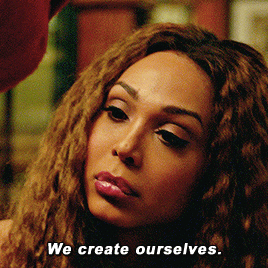
It's really impossible to establish what found family looks like without referring to a show about ballroom culture in NYC in the 90s. We were dying. We were being abandoned. The houses gave people a place to be and a sense of purpose. These kids called their leaders Mother for a reason. Every single queer character in this show was saved by another character in this show before going onto save another character in this show. No show has ever done it like POSE.
Despite their fighting and bickering, Elektra saved Blanca. Blanca would go on to form her own house and provide shelter and support for multiple kids. There is a desperation to queer found family for me that makes it so important. Pray Tell's final choices still resonate with me to this day.
Queer as Folk (2000-2005)
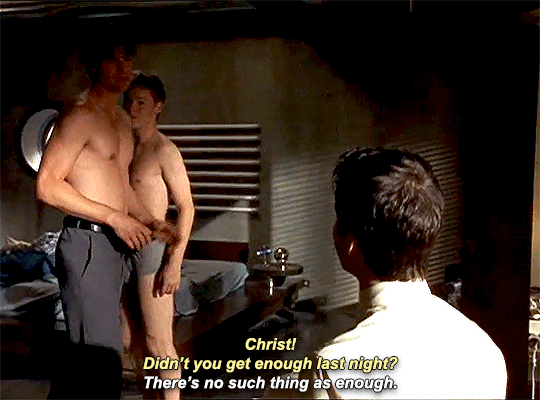
We remember all of the fucking in this show, but this is another show where the queers are their primary support network. Their families aren't really there for them. Justin is kicked out of the house and lives with Debbie for a while, and is nursed by his community after being bashed. Michael and Ben adopt Hunter. Brian donates for Lindsey and Melanie. Debbie housed Brian in the past. Emmett's family disowned him, so his friends are all he's got. The community rallies constantly to protect each other.
Part of what makes this show so special as found family, like with POSE, is how often these folks piss each other off and get into huge fights. They fall out repeatedly in this show over fundamental disagreements that are not easily solved. Some of those fights are ugly in a way only people who know you best can hurt you.
The Fosters (2013-2018)
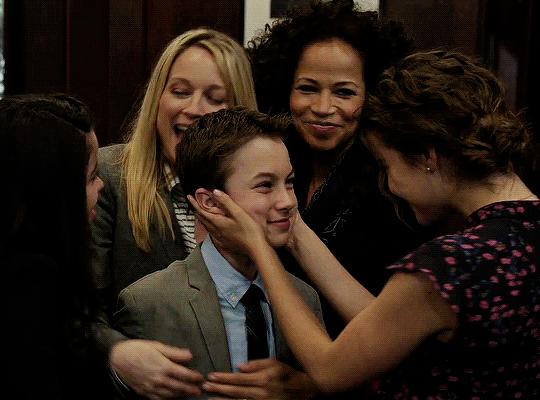
There's no way I'm not including my favorite TV lesbians of all time raising all them kids on this post. These two public servants found each other, made the difficult choices to be together, and keep expanding their family with more fosters and adoptees over time because there's always more love to go around. This show tackled how important it is to be able to call people family, and what it means for that to be a choice over an obligation. These two always found a way to make it work for their complex family and gave a budding queer the space to grow and be a brat of a teenager after saving him from having the shit beaten out of him for wearing a dress.
Sense8 (2015-2018)
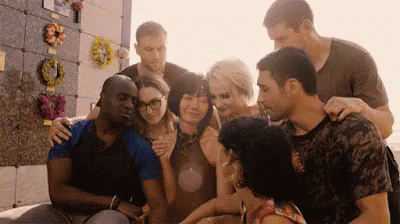
From the directors of The Matrix (1999) and the creator of Babylon 5 (1993-1998), few shows are as queer as Sense8. Eight strangers suddenly become connected to each other and cannot turn it off. Half of them are queer in some way, and it's about their adaptation to each other and looking out for each other as they're literally being hunted. This is one of my favorite sci-fi concepts of all time, and I love the way their relationships outside of their cluster play into their dynamics.
She Loves to Cook, and She Loves to Eat (2022- )
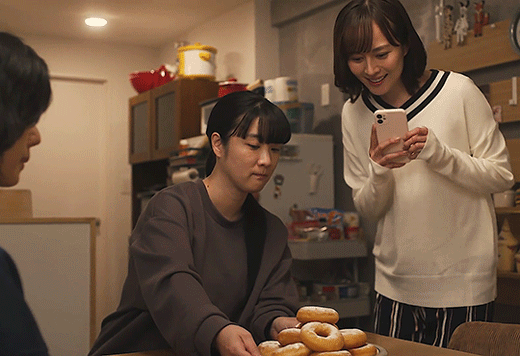
This is a recent favorite for this, particularly because of Season 2. In Season 1, we know that Nomoto puts a distance between herself and her family because of the pressure to become a wife. In season 2, we learn that Kasuga has severed ties with her family because of the expectation that she surrender her own life to take care of her family. When she tells Nomoto this, Nomoto gets angry on Kasuga's behalf and they decide to commit to living together. They are also building their community around them, and I better see everyone in their new apartment in season 3.
Gameboys 2 (2022)
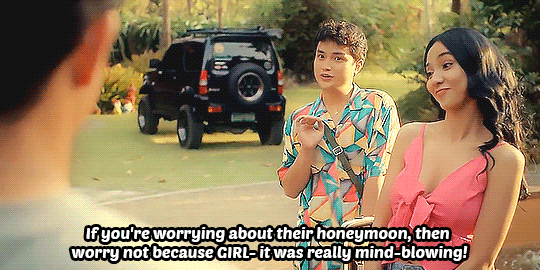
So much of what's going wrong for Gav in this season is that he doesn't feel connected to the rest of his bio family after his grandmother passed, and he's desperately holding onto all of the friendships he has because he's so lonely. It's why he's still close with both of his exes (Pearl and Terrence), and why he won't let them go. Also, he's falling apart and Pearl is the one making sure his bills get paid on time.
The Shape of Water (2017)
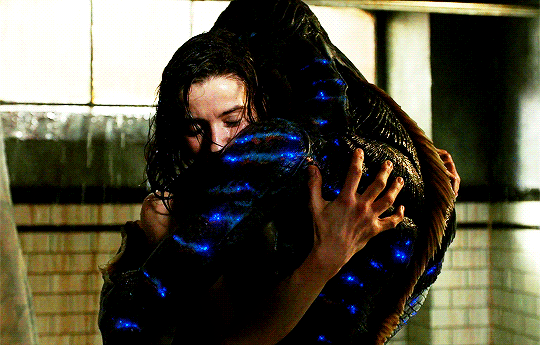
Shout out to my man Doug Jones for always playing creatures that everyone is attracted to. The way this movie is so much about undesirables choosing to love each other and saving each other. Go watch it if you haven't. This film is not about a sexual awakening. It's about loving inside of a white capitalist structure.
Not Queer But Good
Shout outs for my faves. Some have queer characters in them, but aren't inherently or explicitly queer.
The Golden Girls (1985-1992)
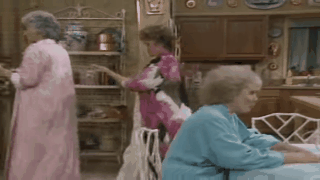
No one did it like them. A bunch of aging women living together and making the most of their lives still resonates almost 40 years later.
Avatar: The Last Airbender (2005-2008)
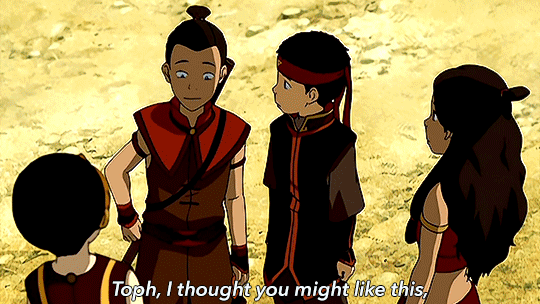
All of these kids are estranged from their families, and are building out something that works over the course of the show.
The Good Place (2016-2020)
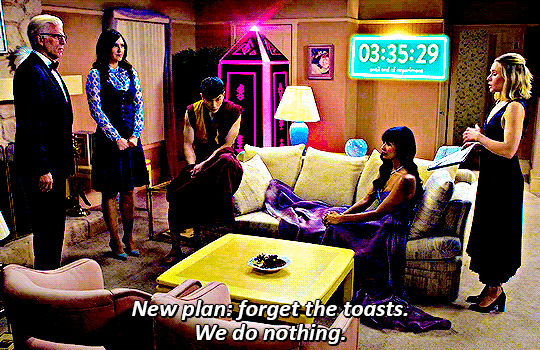
I really love that this is a show about people who didn't get it together in life getting it together in the afterlife because they decided to work together, and then to care about each other. When you're literally being tortured by devils, you're all you've got.
What Doesn't Fit?
This is where things can get a little bit wiggly, but why I want to draw a line on this. I think that shows about queer friendship are important, but I also think that there's a difference between "we are all we've got" and "these people are the most important to me." So we end up with shows like the following.
Noah's Arc (2005-2006)

I often call this the Black answer to Queer as Folk, but I don't think it had time to fully-develop the found family themes in a way that QaF did with its much-longer runtime. Noah and his friends are super codependent and absolutely there for each other, but I don't think the absence of their families is explicitly attributed to their queerness but rather a byproduct of the focus on their gay life dynamics in LA. I love this show dearly, but there isn't a desperation to this that belies the family angst necessary for found family.
For The Boys (2021)
youtube
In many ways a spiritual successor to Noah's Arc, this show falls into the same place. The friend trio at the core of this is the most important relationship in their lives, but this show doesn't have the necessary found family angst.
What about QL?
For me, the biggest problem with doing found family in QL is that the primary genre is romance. These shows prioritize the way these relationships will turn romantic in a way that detracts from the found family component even when it's present. Also, because QL focuses so hard on coming of age plotlines, there's an element more of "finding your people" that supercedes any found family dynamics.
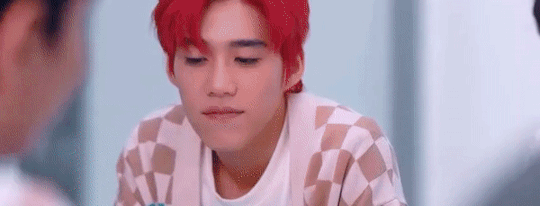
I Promised You the Moon (2021) is a good example of this. The primary drama of this show is about the romance between Teh and Oh-aew and the complications they face once they leave Phuket. Oh finds his people there and blossoms from it, but this is a story about how he and Teh can't get over each other.
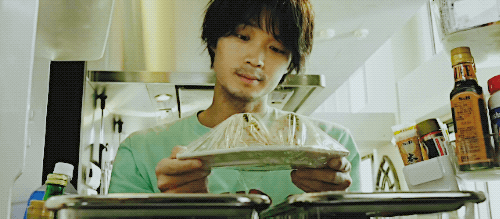
As much as I love What Did You Eat Yesterday? (2019- ), the only real component of that is in Wataru's character. Kenji gets along with his mom and sisters, and Shiro is working on repairing the relationship with his family the entire time.
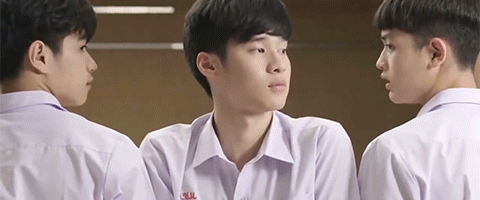
With Thai BL especially, I feel like they're big on friend groups, but not as big on found family. New Siwaj loves big friend groups that love each other, evinced by Love Sick (2014-2015), Make It Right (2016-2017), Until We Meet Again (2019), EN of Love (202), My Only 12% (2022), etc. He's done some great work in the space with queer friends, but not really queer found family.
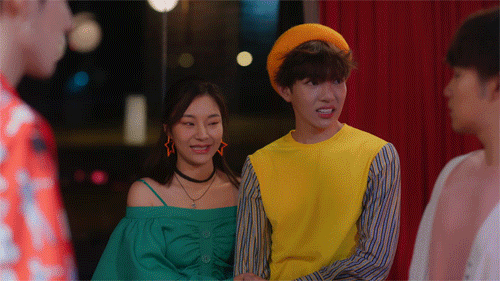
Cheewin, a former collaborator of New's, also loves friend groups that have each other's backs. Probably his best example of that is Secret Crush On You (2022) with that friend quartet. The closest I think he came to found family was Uea in Bed Friend.
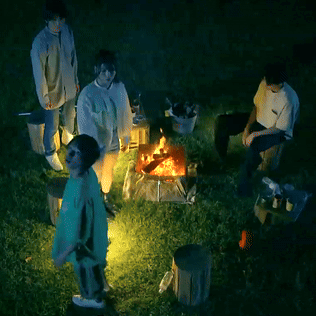
Another example that comes close is the unit that forms on their road trip in The End of the World With You (2023). I often think about this group of queers and the kid they adopted screaming to the heavens that they want to live.
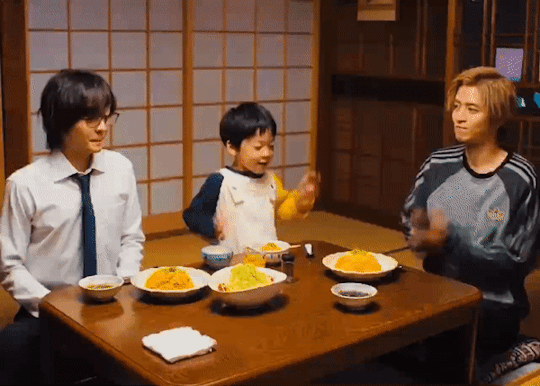
Something I love, but which doesn't count for me is Our Dining Table (2023). There are powerful family dynamics here, but like in WDYEY they're adding Yutaka to their family and Yutaka reconciles with his adoptive family. I don't generally think that adding a romantic partner to your family counts as found family. Besides, Yutaka has a stable job and housing.
Final Thoughts
For me, the stakes are pretty high with queer found family, and it really needs to have a queer basis for me to feel strongly about it. Going back to their bio family is not an option, and often times the terms we use for traditional relationships don't always fit properly (yet another reason why Unknown got so much right). I don't think it's queer found family when they're students in college whose families just aren't around because they're paying for their kids to go to school. Finding your queer community as an adult is a huge part of growing up, but a queer found family is there for the really ugly and desperate parts of existence that your friends might not see.
#answered#Ben writes#pose#queer as folk#sense8#the shape of water#noah's arc#the golden girls#the fosters#she loves to cook and she loves to eat#tsukuritai onna to tabetai onna#the good place#avatar: the last airbender#make it right#love sick the series#my only 12%#en of love#secret crush on you#our dining table#bokura no shokutaku#the end of the world with you#bokura no micro na shuumatsu#until we meet again#bl series#thai bl#japanese bl#filipino bl#gameboys 2#gameboys the series#what did you eat yesterday?
113 notes
·
View notes
Text
In which I try not to be That Guy TM when it comes to Irish ancestors: An exploration of ancestry, diaspora and culture
Because of The Horrors TM in my life atm I've been looking into my biological family tree. I'm adopted but estranged from my adoptive family and I never met my biological family since I was adopted just short of my 2nd birthday. I've been tracing my ancestry for about 3 years now and it's genuinely quite stress relieving to me. It's also fun and challenging from a research standpoint - putting together my own family tree gave me the skills to write articles like this one I wrote in 2022 about historical Welsh queer people, for example.
Lately, I've been finding out more about my Irish ancestors while an adoptee (and thus not knowing any of my biological family) - but also doing this as a Celticist and tired of people doing the 'my sister's friend's cousin's father's mother was Irish' thing. This has created an almost unbearable tension between curiosity at my own ancestry while trying not to be That Guy who finds out about one (1) Irish ancestor hundreds of years ago and is weird about it.
Especially since mine are quite distant ancestors - my great, great, great grandparents were born in Dublin and in a tiny village in County Down called Dunnaman (near Kilkeel). However, they were Irish Catholics and emigrated to Liverpool in the 1870s - all of their subsequent children and grandchildren were born in Liverpool and all of the above + great grandchildren were raised Catholic - including my grandmother (who died before I was born). So there was an obvious attempt to maintain that heritage. There's even evidence my great, great, great grandmother at least spoke Irish (which, as she was born in County Down, would have been Ulster Irish).
The problems with uncritically throwing oneself at an ancestor's nationality:
Now, not all North Americans of Irish (or Welsh, Scottish, Italian, Scandinavian, German etc.) descent do this - but there's a very vocal set of North Americans of Irish descent who find awe and interest in their ancestry - which is actually quite a positive thing! - however, due to either temporal or cultural disconnect, they may end up doing or saying things (and not necessarily with bad intentions) which can have a negative impact on the Irish and the Irish language (or [nationality] and [language(s) associated with that nationality].
I'm reminded of the time an American commented on a Welsh language rights post I made in support of Welsh speakers, but they accidentally ended up using a white nationalist slogan by mistake. It can be a minefield - and with regards to Ireland specifically, mistakes like that can be so much worse. To literally give my own (mild) example, today I decided to relearn Irish (since I haven't spoken any in years since being taught basics at undergrad) and picked up a blank notebook I bought at Tesco the other week, while completely forgetting the inside cover of the notebook was orange. I was planning on decorating the notebook anyway and painted it a different colour. While I know that nobody would really hold it against me if I didn't change the colour, I just know that walking around with an orange notebook filled with Irish I'm relearning because of interest in my Catholic ancestors could be a confusing set of messages, at the very least. If you don't understand why this is, look up the meanings of the colours on the flag of Ireland.
Which is to say, even those of us in Northern Europe who have significantly greater physical proximity to Ireland than North America (and therefore should know better) still can and do get things wrong. And not just benignly wrong like in my case.
The tendency for some North Americans of Irish descent (Canada isn't exempt from this) to conflate Irish ancestry with a contemporary connection to the modern countries located on the island of Ireland as a whole can have results ranging from 'a bit weird' to 'jesus fucking christ'. As a Celticist, I've seen far, far too many Americans of Irish descent try to weigh in on modern Irish politics without any background knowledge or tact at all - and naturally they stake their claim on modern Irish politics entirely on the premise of having distant Irish ancestors. Or, even worse, things start to get all phrenological.
'Irish blood' and the nonexistence thereof:
'Irish blood' is continually evoked by some to validate their sense of 'Irishness' and the obsession with '[insert nationality] blood' is a distinctly North American phenomenon- likely related to or an offshoot of the concept of 'blood quantum', in which enrolment into some Native American nations and tribes is determined by how much 'Native blood' a person has. Notably, many people who would ostensibly have been described under this system as 'full blood' were registered by the US as 'half blood'. This is a method of genocide intended to wipe out tribes and nations by imposing strict measures of who does or does not qualify to enrol into a tribe or nation. This concept seems to have been extrapolated over time (in a North American context at least) into the idea of descent from other nationalities' being measured in a similar or adjacent way. This is how you end up with some North Americans declaring they are '1/8 Italian and 1/4 Irish' on their dad's side etc. While in Europe (where these nationalities hail from, crucially) this practice is seen as a really weird way to describe your ancestry. In general, it's simply 'my 4 times grandfather came from Spain' or 'my great great grandfather on my dad's side came from Finland' etc. if it comes up at all. For various political reasons, many Europeans with descent from multiple other European nationalities may choose to omit to mention descent from certain nationalities, especially if in recent history there has been conflict between their birth nation and an ancestor's nation. The most famous example of this is literally the British royal family changing their surname from the German Saxe-Coburg and Gotha to the more 'British sounding' Windsor in 1917 due to the onset of the First World War.
Where it gets really weird (and also very offensive and rude) is when cultural stereotypes get invoked alongside the whole 'blood' thing in usually quite damaging and/or disparaging ways. I've seen way too many North Americans of Irish descent claim they're alcoholics because they have 'Irish blood' or even worse, claim it's normal to domestically abuse their spouses because of it!! (Genuine thing I have seen btw). Same goes for claiming to be a naturally good chef because of 'Italian blood' and so on. As a general rule, people from the place where your ancestors were from don't generally like to be inherently be considered drunks or prone to violence due to their nationality. Or have weird and inaccurate idealisms projected onto their language or cuisine.
Aren't there any positives?
It wouldn't be fair to make a post like this without mentioning some of the positives that can come from interest in an Irish ancestor. Like I mentioned at the start of this post, I myself felt inspired to relearn Irish because of my own Irish ancestors. I was taught the Connacht dialect at undergrad, however, since my ancestor was from County Down, I'm going to try and learn Ulster Irish instead. One doesn't need Irish ancestors to learn Irish of course - when I learned I wasn't aware I had any Irish ancestors. But being inspired to learn Irish because of an ancestor can't hurt and directly increases the number of Irish speakers in the world (provided you keep at it). This is a net positive for the language as a whole.
Similarly, people who have educated themselves on Irish politics because of their ancestry and genuinely learned something are also a positive thing to come out of discovering Irish ancestors. In my experience, these people are the kind of people I enjoy talking to about being a Celticist because they actively want to learn and respect the cultures being talked about. Which is huge to me!
Conclusion:
As a Welsh speaker whose national identity is more-or-less Jan Morris-esque, my Irish ancestry is an interesting facet of my ancestry I simply didn't know about before. And being an adopted person, I can sympathise with the general sentiment of a lot of white North Americans of feeling disconnected or alienated from any ancestral heritage. The conditions which create That Guy TM as described above rely on that sense of alienation to propagate a very ineffective, tactless and often very insensitive approach to Irish and other European cultures. But the important thing is that that approach can be challenged by people genuinely interested in their ancestry who are also conscientious of the living versions of the cultures their ancestors hailed from.
For me, that means learning Irish in a dialect my ancestors are likely to have spoken. I also visited the library today to check out some books on the Irish emigration to England and the sociopolitical reasons behind that emigration. I know the broad strokes, but the details are desirable to know to get a better idea of the why and how the country of my birth had a hand in creating the conditions which led my ancestors to emigrate in the first place. I think the world would be a better place if people took the time to understand the history and politics of ancestors which don't share their nationality.
As always, reblogs and thoughts are welcomed and encouraged!
Thank you for reading to the end - and if you'd like to support me, please see my pinned post. Diolch!
#long post#Ireland#Irish#Gaelige#Celtic Studies#Celticist#Irish diaspora#Irish americans#blood quantum cw#racism cw#(just in case)#ancestry#geneology#family history#I've probably made typos but it's 11:40pm and I need to go to sleep
55 notes
·
View notes
Text
Identity issues: Italian edition
#i am so insecure GODDDD#one little comment even though i know im right still got to me#like ofc i didnt mean community like fandom#the word community can be used for anything#black community?? asian community??#like hello??#and yeah indentity isnt about blood but culture but i guess fuck people whos families assimilated#and fuck adoptees not raised in their culture#fuck those affected by colonialism#italy is a country- fuck off i know#its not my fault i was sheltered and had no contact with either sides of my family#i struggled with identity growing up and i still struggle#i hated filling out forms for race and ethnicity bc it was only allowes one option#like i ahouldnt even be doing this trying to prove myself but i cant help it#ive been welcomed open arms from other Yoemem. cant say the same with italians#but even if i was. id still have this problem and its not just a me thing#like how many times do i have to convince ppl that i know i look white and grew up white#that i know my place. that i know my privilege. that im not just trying to be lightly seasoned off white#i feel like i have to be so small and ibalso feel like im making a big deal about it all#i doubt myself. everything i do i feel is watched and judged. everything i do feels like im just trying to convince#even if it definitely is not the case#and i get it though. i know why people are like this. like i 100% get it#bc pretendians and the like. culture vultures or wtvr. i guess like teaboo but for italians#miaboo?#i know im not the only one bc ive talked to other ppl in the same boat as me#it doesnt help that i have so much working against me in terms of disability#memory problems always sleeping overwhelmed easily cant focus. so i end up doing so little#which feels like it indicates that i dont care enough#i try not to even think about stuff like this but it always is brought up in some way like a stupid little comment#oop too many tags welp
2 notes
·
View notes
Text
my best sf/f/horror read in 2021!
top 5:
The Xenogenesis/Lilith’s Brood trilogy: an alien race saves the last of humanity but also links itself irrevocably to humans’ families, lineage, and culture. themes of love/coercion, paternalism, the lines that humanity in general and men specifically won’t cross. the second book UNZIPPED me.
the sparrow: what if jesuit priests made first contact with an alien species and delighted in the gift of being able to meet god’s other children. what if that mission ended with its sole survivor mutilated and psychologically broken. how did he get that way? where can he go from here? themes of communication, god/fate, purpose, loneliness
ring shout: I’ve rec’ed this approximately ten times already but READ THIS. a group of female vigilantes fight demons who are in league with the KKK. NOT anywhere near as campy as it sounds. themes of anger and who it serves, community, what is a monster
harrow the ninth: what if you were a baby immortal who ascended to immortality to serve the undying space emperor, your God? what if something was fucking with your memory and your brain might be haunted by more than just the beautiful corpse you’re in love with (that part you already knew)? what if the line “hi not fucking dead, I’m dad”? what then. NO themes JUST vibes, insane lesbian wizards, and bones <3
the three-body problem: hey guys? you’ve never heard of this one, right? Obama himself doesn’t have a blurb on the back, right? anyway. read for aliens, what humanity will do in the face of a world-ending threat, and surprisingly well-drawn character moments for a book on such a huge scale. it’s like 500 pages and I finished it in two days
honorable mentions below the cut
honorable mentions:
my heart is a chainsaw and the only good indians: supernatural horror is stephen graham jones’ world and we’re just living in it. the first is about a teenage girl mapping her life onto the slasher movies she’s obsessed with to cope—she thinks a final girl has come to her town, so that must mean it’s about to get bloody. the second is about a group of men being stalked by the ghost of what they did together as teenagers.
the once and future witches: I thought this book would be very hashtag girl power but it’s actually great. a sweepingly large-scale story of witches during the american women’s suffrage movement, by the author of the ten thousand doors of january (also a winner)
the chosen and the beautiful: the Gatsby retelling everyone’s talking about—what if Gatsby were about jordan baker, a vietnamese adoptee and casual practitioner of magic? i’d call the vibe dark academia except that it doesn’t suck and there’s no academia, but you know what I mean.
the ballad of black tom: novella about a street musician who gets caught up in a rich man’s plot to raise a lovecraftian horror. cosmic horror with a narrow focus.
black sun: in a precolumbian-inspired high fantasy world, a strangely ritually-injured man must be conveyed across the sea by a dashing sea captain (xiala my absolute beloved) before a deadline she knows nothing about. across the sea, nobles and religious figures plot. first in a forthcoming series
sorrowland: hello????? hello??? rivers solomon you are kissing me on the forehead with this book. a very human version of gothic horror tinged with folklore with a dash of dystopia and octavia butler — it’s got Parable-slash-Fledgeling vibes. about a girl running away from a cult with her two infants and developing her own life with them. great but Unkindness of Ghosts is still my favorite Solomon.
the terror: is this a “good” “book”? yes and no. do I recommend it if you’ve already seen the tv show? not unless you can erase it from your brain. was it so intense that it boiled my brain and gave me physical symptoms that made me afraid I had covid? absolutely. read this for (relatively clumsy) anticolonial period horror and to feel like you’re there with them, counting out the cans that are left for your desperate journey home as you’re dying of disease and starvation and cold and a monster polar bear. yay
paul takes the form of a mortal girl: a college student uses his newfound ability to shapeshift to take on different genders and identities. irreverent, funny, and with deeply believable characters and thoughts on gender
the devourers: a scholar is approached at a party by a man claiming to be half werewolf, And You Won’t Believe What Happens Next. dark and atmospheric mythology/urban fantasy if the “urban” in question was the seventeenth century and also modern kolkata. love, family, desire, monstrousness, werewolf romance, and eating human souls. what else do you want
the space between worlds: thought this would be another hunger games-esque New Adulty ripoff but it actually Slaps. one of the few people who can step between dimensions leverages this skill to earn her keep in the only wealthy city in a desert wasteland run by crime lords and plagued by hunger
runners up:
machinehood: robot rights activists, gig economy bodyguards, and world governments battle it out in a techno-future. sci-fi action
the patternist novels: in an interconnected but discrete series of novels, one man weaves a “pattern” in thought that keeps the world in order, and others aren’t huge fans of his order. spans modern character-driven novels and futuristic more action-based ones
the faceless old woman who secretly lives in your home: a night vale novel about how the faceless woman came to be, feat. revenge, pirates, secret societies, and a man named craig. the genre is “if asoue were for adults”
a master of djinn, the haunting of tram car 015, and the black god’s drums: a novel and two novellas set in p. djeli clark’s djinn-powered historical fantasy world. the first two are mystery set in egypt, the last mystery-action set in new orleans
split tooth: one woman’s early life is mythologized in a book I can’t describe well at all. folklore/myth set in the modern world.
the invisible life of addie larue: a woman who is cursed to be forgotten every time people look away from her navigates centuries. character-driven historical/romance/fantasy
moon of the crusted snow: in a small anishaabe community, the power goes out and the outside world is in chaos. small-scale community-focused apocalypse fiction.
mexican gothic: haunting of hill house-esque gothic horror with a sci-fi twist set in an isolated manor in the countryside
famous men who never lived: refugees from a dimension largely like our own make sense of their new home. litfic with a sci-fi premise.
sorcerer to the crown and the true queen: regency england’s sorcerer-in-chief must restore magic to england with the help of an unlikely ally. sequel set in the same world is about two malaysian sisters who have to find out why they lost their memory and what magic has to do with it. historical fantasy with the feel of YA (affectionate)
the rosewater trilogy: a sentient alien ship lands outside of Lagos and a town springs up around it because of its power to heal. sci-fi action.
tender is the flesh: a supplier of human meat to the rich has qualms. small-scale dystopia.
the house in the cerulean sea: adorable romance set at a group home for young magical creatures. somehow like if asoue were happy and if good omens didn’t have the apocalypse in it
the night tiger: a dance hall worker in 30’s malaysia finds a finger in a box as a weretiger is said to be on the loose. lush historical fantasy
@narrative-causality your post has arrived!
#my posts#reading tag#NOBODY look at this list and go ‘wow I barely read anything this year’ pls remember I was underemployed and quarantined for much of the year#it’s for you to find good books!!! i would recommend everything here#please feel free to ask any questions or tell me what you think of them!#yearly book roundup
63 notes
·
View notes
Text
Look, I firmly believe that you shouldn’t adopt trans culturally UNLESS you’re willing to help your child preserve the culture of their birth (at least until they’re old enough to tell you if they want to have that connection or not). Like, take classes together in what would have been their native language, learn to cook the food of where they were born, if they already have a name, DON’T FUCKING CHANGE IT! If they don’t have a name yet, consider their culture when you name them. You can’t just take a baby from a minority culture and raise them as if they’re white because they WILL feel isolated. They’ll be marked as “other” for their skin color and/or minority features, but they won’t feel comfortable with people who look like them because there will be a cultural divide and people can be judgemental as hell if you look like them but don’t know their traditions and that shit is heartbreaking. Yes children can and should be able to form their own identity, but I really really believe that children at least need to know enough about *every* facet of where they came from to be secure enough to build that identity. Granted, a lot of this comes from being a Jewish person whose Jewish parent is their father and who was raised in a non-Jewish area with a dad who worked a demanding job. He tried to reach us as much as he could but even he admits that he wishes he could have done more. We were “Christmas tree Jews” and I feel a bit like I’m an imposter in my own culture even though I’m so proud of it and consider it an important part of my identity. But regardless of how much I know about my culture or practice it, just the fact that I was born into it is enough to make me “too Jewish” for some people. And yeah, fuck those people on both sides who think I’m not enough, because they’re wrong, but at the same time, it’s much harder to say that as a kid. You need firm footing to find an identity, often times much further footing than even the most loving family can give you on its own. I mean holy fuck, if you’re not willing to at the very least learn how to say your new child’s name properly, pop in a Rosetta Stone tape, and either call the local restaurant or fuck around in the kitchen until you can make a passable ropa vieja/ Phở/ jīndēui/ sambar and some dosas (even from a packet!)… etc, then I honestly don’t think you should have the privilege of being able to deserve such a beautiful gift as a child. Because every child is different, with unique needs based on that child. A transcultural adoptee is more than likely going to have the need of some sort of stable cultural identity to feel secure, and providing that to the very best of your ability is part of your job. It’s the same if your biological child is bicultural, and for whatever reason you, a member of the majority culture, end up as a single parent- it’s your job to give them enough of a background in *all* aspects of their identity that they feel comfortable enough in themselves as a whole to forge their own identity.
#mod des#desi Hari got me thinking about this again ngl#but I see it all the time and think about it a lot#majority adoption of a minority culture while actively erasing their heritage is cultural genocide#multiculturalism is a beautiful thing and we should all be learning and engaging as much as we can#but it becomes a necessity and an obligation even more so when you’re adopting trans culturally#or have a bicultural child#transcultural adoption#where your child came from is a beautiful part of the. and you need to show them that#if they grow up and reject that culture completely that is their decision. and their right#but they at least need to have enough of a background to make that decision confits my and securely#and not out of fear of being seen as ‘other’ if they try to learn late and life and thus avoiding ever trying out of fear
36 notes
·
View notes
Text
Bossk HCs: Bossk and his kids 🐊
had some THOUGHTS about bossk having kids with you so I thought id jot them down here.
this is all in the event that you and bossk have been in an established relationship for awhile and are ready for the Next Step ™️ which is kiddos!
At first Bossk thought he was gonna end up having Trandoshan kids because he was brought up in Trandoshan culture and just thought thats how his life would go maybe
It wasn't until he helped raise Boba after Jango's death that he found he was completely fine with having kids that were not his species
There's no going around it, you and Bossk are going to have ALOT of kids. Mostly because Trandoshans have multiple hatchlings at a time anyway so having multiple kids is the norm
Majority of your kids were adopted by you and Bossk. There have been times where yall found orphans while on a bounty hunt and decided (with the child's permission) to take them in
Bossk loves his kids! He is fiercely protective of his family
You know how in animal documentaries they show lion cubs crawling all around their mom and the mom is just like 😐😑😐
Thats Bossk with his kids, just straight up vibing
He lets them crawl around and climb on him, he doesn't mind
There have been multiple times where you've come home from a bounty hunt or even the fucking grocery store and see Bossk laying on the ground with the kiddos playing all around him
If your a bounty hunter/have skills where you can easily defend yourself, Bossk doesn't mind if you go on a hunt while he watches the kids. You guys switch who go on bounties depending on what the job is. However if the kids are really young then he much prefers you to stay with them while he goes hunting.
All the kids understand 'Dosh and can even understand its written form.. it's speaking it back that's the hard part since Dosh is very gutteral and it's hard for non-Trandoshan species to pronounce
When Uncle Boba visits, he gets hug attacked and knocked down everytime. They love him
Uncle Boba also just assumes any child in your house is another adoptee even if they arent lol
You and Bossk adopted one orphaned Trandoshan girl from an Outer Rim planet, she seemed to be the runt of her hatch so you figured she might've been abandoned
Bossk named her "Fett" after Boba
#im not crying your crying#i had to stop studying to write this down because my mind wouldnt let me do anything else#bossk#star wars#swtcw#star wars the clone wars#Star wars original trilogy#tcw#saint writes
25 notes
·
View notes
Text
so i wanted to talk about some things i received in my inbox the other night. it’s something i talked about in my edit to my pinned post, and if you want to go back and read that and call it a day, cool. if not, you’re welcome to read on. i just wanted to make sure that i addressed this issue, sensitive as it might be. you don’t have to read anything if you don’t want to, and you don’t have to agree with me if you choose to read this, either. it’s okay. you’re allowed to feel whatever you feel about me and what i do. that is your call, and i understand either way, no matter what choice you make.


so. while i saw in my bio page that, no, i never explicitly stated mercy’s ethnicity, i have acknowledged and stated where she was from and her backstory through my writing, be it through dash games or the threads that i have written, or headcanons i’ve posted. however, to newcomers to this blog, that wasn’t fair. so i’ve changed that for you. part of my reasoning for the bare bones that was mercy’s bio was because i just wanted to get something up for the sake of getting it done, and another part was because i figured that since sofia was colombian it would be inferred that mercy was as well. i suppose that’s pretty unfair, though, and i should have stated it outright. i’ve corrected that. but it should also be said that i’m not rping as sofia vergara. i just use her as a face claim. i didn’t actually want to ever use a fc for a character, and wanted to describe my characters through my writing. but here on tumblr, that’s not really an option. not having a fc meant that most people would pass me by (the fact that i’m iconless also doesn’t help me much either, so i had to figure something out), so i had to choose one. i chose sofia. perhaps there’s a weird disconnect there, not being able to separate this woman from my OC, and i get that. but i’ve not ever tried to pass mercy off as white. ever. because she isn’t. she was adopted into a family from a very young age (18 months) and raised by a second-generation sicilian woman and a white father. now. this family raised her in new york, and new york is a state where there are no mandatory cultural workshops or classes to enroll an adopted/foster child in to preserve their cultural background. (and unfortunately, there are only a handful of states that have this law.) the responsibility of educating and encouraging an adoptee/foster child of their respective culture falls upon the parents in these places, and sometimes parents don’t do that. sometimes adoption agencies ask, “are you willing to love your child regardless of what color they are or where they come from even if they don’t look like you?” and... that’s the extent of it. by saying ‘yes’ to this line of questioning, the adoption is completed, and no other sources are provided that could assist in helping the child develop throughout their lives.
oftentimes the narrative around adoption of children from other countries focuses on the parent being ‘a savior.’ and that’s just what mercy’s mother did, because she’s a vain piece of garbage who only used mercy as a tool to further her own ambitions. her father loved her, sure, but he was always working and wasn’t around to protect her as much as he wanted (and was eventually killed). this left her with her mother, a woman who didn’t give a flying fuck about how mercy felt about anything, and only wanted a daughter so she could find an in with an influential and wealthy crime family, using mercy as a way to bridge that gap by marrying her off to one of their sons. with her mother’s ties to LCN, or la cosa nostra, the italian-american mafia, mercy’s identity wasn’t a concern for her mother. when living that life, it’s all about the family. you live for the family, you die for the family. and since mercy suffered so much emotional and physical abuse at the hands of this woman and her brother, she sought only to appease them and assimilate as best she could for their approval. she was told repeatedly that she should be grateful for her being adopted, that she was ‘rescued’ from a terrible life, that she wasn’t wanted by anyone, so she already was turned off by the idea of looking into where she came from to that end as well. if her adoptive mother didn’t love her and was telling her that her biological mother couldn’t wait to be rid of her, what would you expect from a situation like that? and considering she didn’t know there were resources for adopted kids like her to connect with her cultural background, she was pretty clueless on that front.
she grew up around a bunch of rowdy boys in a rough and tumble neighborhood. she had to fight to survive, had to steal and break into peoples homes to find food to eat because her mother didn’t give a fuck about making sure she was fed. her focus was always on survival and appeasing her family. she wasn’t given an opportunity to go much further than that.
she knows she’s different than her family, that she doesn’t look like them and doesn’t ‘fit in,’ but she doesn’t know what to do with that information because she’s never had communication about it. from the articles i’ve read, the podcasts i’ve listened to, the blog posts i’ve perused, the excerpts from books i’ve found, and from speaking to friends that were adopted... every experience an adopted child faces is unique. their journey is difficult, sure, but it’s also especially difficult for kids of different races and cultures being adopted into a family that is white or of just a different background altogether. sometimes they don’t feel “latina enough.” sometimes they don’t feel “white enough,” even knowing that they aren’t white. they wonder if they’ll be accepted by people that look like them because they weren’t given the opportunity to learn the language of their birth country. they wonder how other people see them or how they fit in. they can feel ostracized because of these things, not accepted by either community. some adoptees face discrimination on all fronts because of these facts. that they just aren’t worthy or don’t fit in because they don’t meet a certain set of standards that other people who look like them may hold over their heads (either real or imagined). sometimes they do feel like they’re washing their hands of the culture and country they came from, like you’ve stated above, especially when they were raised in america from such a young age.
studies have shown that adoptees/foster children thrive when their parents teach them at a very young age about their places of origin, and they benefit from the conversations their parents have with them about the issues that they will inevitably face: racism, discrimination, microaggressions, intrusive questions that invalidate their family unit (’why don’t you look like your parents?’ ‘yeah, but where are you really from?’), amongst other things. it creates an awful sense of disconnection between the adoptee and the world around them, makes them wonder where it is they truly fit in, or if they’ll ever fit in anywhere. they’ll oftentimes wonder if they even have the right to try and find others that look like them because they don’t know enough about their peer group or if they’ll be accepted by them or not.
some adoptees choose to embrace their roots with pride because they find a sense of belonging and community in that connection. others choose not to. some choose to learn about their cultures later in life and some approach it with trepidation rather than with open arms. each and every journey is different and unique to the individual that may or may not be seeking answers about their home country and where they come from, and it isn’t anyone else’s decision to make on how they decide or when/if they decide to do so. learning more about the culture of the adoptee’s home country is an exciting experience that they can do at their own pace, and that journey is theirs alone.
so. because of how mercy was raised, with the abuse and neglect she faced from her adoptive mother and brother, and after losing her father at a somewhat younger age, mercy found it most important to find acceptance from others in the form of her found family, her crew, and they love and honor her no matter who she is or where she comes from. to her, that’s what’s most important in her life, seeing as how she was never offered that kind of support before. and considering the way she was raised she wasn’t given the opportunity to embrace her background, and the older she’s gotten, the more she wonders if she even has the right to do so. her criminal activities keep her occupied, and her present worry each day is whether or not she’s going to continue to breathe or if she’s going to catch a bullet between the eyes.
eventually mercy would like to settle down and have a normal life outside of her nefarious activities, and when that happens, maybe she’ll consider delving deeply into where she comes from and the customs and culture of her birth country. but because of her upbringing and how it’s sullied her views on the past, she’s always facing forward and living in the present, without much thought about the past (or even the future, because she doesn’t know how long she’ll survive given her lifestyle). mercy doesn’t care about where she’s been, since it’s rife with pain and insults and reminders that she wasn’t wanted by anyone. all that pain and the fear of rejection and abandonment deters her from looking back often or at length. but maybe once she’s found some peace, that will change, and she’ll finally take the time to look further into her roots.
i hope this helps clear things up and explains why i write mercy like i do. again, i’m sorry if i’ve ever made anyone feel like i’ve discounted anything or made anyone feel disrespected or hurt anyone in any way. it’s never once been my intent. i’ve never approached this lightly or with ill-intent. i hate that i’ve even had to talk about this at length and i am quite frustrated because i feel like just about anyone who knows me understands what i’m doing and how and why i approach things the way that i do. but i also understand that not everyone is going to agree with what i’m doing, and may have such a knee-jerk reaction like the ones above that they’d immediately feel attacked or hurt because they don’t know me and didn’t talk to me. and that’s okay, i suppose. you don’t have to talk to me if you don’t want to. but i at least wanted a chance to explain what i’m doing and where i’m coming from if anyone else might have been curious about this particular matter.
#ooc#long post#addressing some issues with anons#i wanted to give myself time to process it#and not come at it in a combative way#i hope i accomplished that#and i hope this is cohesive and explains where i'm coming from and what i'm trying to do
5 notes
·
View notes
Text
Yesterday morning at breakfast (I had spent the night with my grandma, after a family reunion) I got into a screaming match with my parents about minimum wage - well, it started there, but it ended with me shouting that Trump is a traitor and a murderer who belongs in prison, so it all went really well. 🙃
As i told twitter,
It's really devastating to feel that the more your parents get to really know you, the less they love and respect you. To realize that they PREFERRED the version of you too scared to talk back, too ignorant and indoctrinated to know better, too passive to assert your own ideas.
They're fundies. They chose to raise me as a fundamentalist christian, and all the pain and terror and trauma of my upbringing was intentional. I really, really, shouldn't be this shocked and heartsick; I knew who they were. I've always known. That's why I've always been afraid.
It's just a gut punch, to have all the final illusions of your parents as good people who could love you unconditionally destroyed. My faith and trust in every other institution of human society has already been eradicated this last year. This was just the last bastion.
I don't know where to go from here. I'm done pretending to be the version of their daughter they can love. They can either choose to love me as I am, or to stop. I can no longer traduce myself and my sense of morals with silent teeth-clenched smiling anymore.
The worst part, though, is that on the car ride home my mom basically told me that i just would never understand the kind of love biological mothers have for their children if I never have my own. That my love for Ian isn’t the same. That she’s actually kind of surprised by how much I love Ian.
there isn’t an adoption tradition in korean culture like, at all. Along with a lot of other factors, the fact is that korean parents just … don’t want to adopt children that aren’t related to them by blood. (This has been changing with the many other cultural mores Korea has borrowed as they've modernized, but it's still an issue.) It’s part of WHY there are so many Korean-American transracial adoptees.
I told her that if she didn’t want me to love all the people in my life, irrespective of how they are actually related to me by blood or legal ties, then she shouldn’t have had me hanging out with dad’s side of the family so much, with all their permutations of stepparents and step-cousins once removed. Because that’s how I love.
Then she apologized (sort of?) for not spending as much time and money on Ian as she does on Graeme and Everett. I told her he has plenty of people in his life to love him and give him things, and that if I wanted more from her, I would simply ask for it. That I wanted her and dad to see Ian and spend time with him because he’s a wonderful kid to be around. But that I didn’t expect if of them.
I was kind of numb with shock at the time, which is really, really good in retrospect. I was running the “Make the Person Talking to Me Comfortable and Happy” routine, and it doesn’t even occur to me when processing conversations that way to get angry or confrontational. (I think part of my mistake at breakfast was how tired and out of it I was – I'm really not a morning person at ALL.)
It was only while mulling over it on the drive home that I started to get really angry about it.
What I wish I had told my mother is that I only want people around Ian who can love him freely, and that if she can’t do that, then she shouldn’t bother.
I’m just devastated, and so profoundly disappointed in my parents, that they would choose their racism over their black/biracial grandson, over me.
But I got the message. I don’t think my parents understood what they were communicating to me: how visible was their contempt, disdain, and disinterest.
I don’t know. I need some distance. I want to be done, to be fucking finished with them. Any possible benefits derived from having a relationship with them can’t be worth either feeling this way, or the unendurable labor of continuing to mask and smile through gritted teeth.
I think trying to get closer to them was a mistake. The impulse I have followed over the last decade, of staying as distant and disaffected as I can by them, was the right one, and I shouldjn’t have tried to ignore it because I wanted their love. At the price it is not worth having.
Right now I just feel numb. I think the rational bits of my brain are trying to prevent me from doing anything irrational. I need counsel, but I need to find a therapist to replace the one I had.
9 notes
·
View notes
Text
Huxley’s adoption story is part of a much larger narrative about race, disability and abuse
by Lydia X. Z. Brown
As an autistic adult who is also a transracial, transnational adoptee from China, I am fucking infuriated and disgusted, but entirely unsurprised.
By now, you’ve probably heard about the YouTube influencers who made international news for abandoning their autistic child after adopting him from China almost three years ago.
Huxley, originally adopted by the Stauffers, is one of thousands of children, many children of colour in the Global South who are adopted each year by predominantly white families in the Global North. Since his adoption – which was documented for YouTube in meticulous detail, including the fact that Huxley was disabled, the Stauffers have filmed numerous videos of him for their YouTube channel that they monetised and gained major corporate sponsors for producing. They filmed and posted videos that showed Huxley having meltdowns, which are terrifying, vulnerable moments. They are extremely emotionally, cognitively and physically draining for autistic people. They filmed and posted videos that showed Huxley with duct tape on his hands because his mother wanted to stop him from sucking his thumb. All of this is painfully familiar for autistic people, who routinely see nonautistic parents of autistic children exploiting and monetising their children for internet fame with no regard for their children’s autonomy, dignity, or privacy.
The Stauffers, who also talked about wanting to adopt another child from Uganda or Ethiopia, horrifically decided that because Huxley turned out to have more disabilities than they realised when adopting him and was doing things that they found scary (never specified as to what precisely), they needed to find somewhere else for him to live.
Describing this process as “rehoming” Huxley to a “new forever family” – descriptions most often found in discussions of rescued dogs – only reinforces the kind of ableist dehumanisation that autistic and other disabled people commonly face. I love dogs and cats. But I also know as a person of colour that white supremacy has long deployed animalistic comparisons as a means of dehumanising black, Native, Latinx and Asian people, while also implicitly or explicitly devaluing our lives as less important than that of non-human animals. (One need only to look toward the white liberals who are far more outraged about a white woman choking her dog than that she brazenly threatened a black man with death). Yet despite the Stauffers’ claim that they made a careful, reasoned choice, they were, in reality, participating in a less overtly awful part of a vast, unregulated and shadowy world of human trafficking poorly disguised as attempts to find new loving homes for adopted children – often disabled adoptees of colour – who are ultimately treated as expendable and disposable.
And yet, at the same time, many of us in disabled community are actually minorly relieved that the Stauffers abandoned their child and sent him to a different family because at least they didn’t murder him. Before you ask whether I’m hyperbolising or sensationalising, let me point you to the list of names maintained on the Disability Memorial website – a list of disabled people who were murdered by family members or caregivers that we read at yearly vigils. A list of disabled people whose lives were deemed tragic rather than their murders, whose murderers were lauded and praised as heroes, martyrs, angels, or saints, for taking on the great burden of dealing with us only to understandably snap from all of that stress. A list of disabled people murdered in calculated, cruel, horrific ways, as well as by deliberate neglect and years-long abuse. A list that has grown so long since the first vigils held in 2012 that this year, vigil organisers stopped reading the whole thing, because it would have taken hours just to say the names. The bar we have for these parents is so goddamn low now.
When I was still a baby, I became one of 787 children adopted that year from China by families in the United States. Like thousands of other transracial and transnational adoptees – children adopted by families of different races and nations than their own – I grew up with a fractured relationship to my own heritage and culture of origin, unable to access the same type of multigenerational and ancestral wisdom and knowledge as people raised by families and in communities who share their culture and history. And like many other disabled, queer and trans people, I also grew up in a family where I was the only one of my kind. Transracial adoptees, disabled people, queer people and trans people often share a particularly pernicious experience of isolation and alienation, a permanent outsider status or liminal existence, where we never fully belong anywhere. We are unmoored, marked indelibly by trauma made ordinary, our lives and experiences constantly subject to exploitation by those with more power and resources – even to the point of erasing our very existence.
Huxley’s story – no matter how much the Stauffers cried in their video describing what happened – also lays bare what many of us adoptees already know. The adoption industry – in both domestic and transnational adoption – is fueled by global white supremacy in the guise of white saviourism and it’s grotesquely ableist and capitalist. Dominant narratives about transracial and transnational adoption portray children of colour in the Global South as helpless and malleable infants who need to be rescued or saved by white people in the Global North, who will give us “a better life” because our own communities and cultures are presumed backward, uncivilised, uneducated and wrong. This logic is not only colonising and often orientalist but also profoundly ableist on a civilisational scale, by positing that white-dominant and Global North societies are superior to those of negatively racialised people in the Global South.
Transracial and transnational adoption often functions as little more than a less obviously awful form of human trafficking designed to serve colonial interests – and indeed, even domestic adoptions have a long history of eugenicist and racist aims through the use of residential schools and spurious labels of mental defectiveness, promiscuity and criminality to declare black, Indigenous and other people of colour as unfit to parent. That history continues today as state authorities frequently work to deprive black and Indigenous disabled parents of their children while simultaneously prohibiting many black, Indigenous and disabled parents from ever adopting children.
My heart breaks for Huxley, because I could have been him. And we know that untold numbers of other disabled adoptees remain at risk not only for another abandonment, but for further abuse, exploitation, or even murder – after all, that’s what happened to Zha-Nae, Sherin, Sabrina, Kentae, Nicholas, Jeffrey, Brandon, Grace, Mirudula, Elsie, La’Marion, Courtney, Madoc Hyeonsu, Terrilynn, Shane, Mollie, Noah and undoubtedly many more we will never know. There is no easy policy solution to the problems endemic in the child “welfare” system, let alone the underlying conditions of deliberate impoverishment, deprivation and dehumanisation of negatively racialised and disabled people that feed these systems. But those who are impacted are desperate for hope that Huxley might have some chance to live through this new trauma – that perhaps one day he will find community and belonging.
(Link in the notes)
108 notes
·
View notes
Text
The thing ppl don’t realize about being a Korean Adoptee is you get shit on by literally everyone.
Your adoptive family shits on you for being ‘ungrateful’ when you want to actually have a connection to your culture.
Native Koreans shit all over you for not speaking your own language well or at all despite having absolutely ZERO control over having been raised in an American household where the primary language is English.
And white Americans will shit all over you because they’re racist against Asians.
You can never fucking win, everyone rejects you, and it’s literally not your fault.
3 notes
·
View notes
Text
Things I regret and things I wish I had done better in pushing Diversity in Books
Probably a bit self-aggrandizing... and I’m aware of that. And I’m aware most people won’t believe me, but I have documentation. (I also pushed diversity in Korean dramas a bit, too lol, but that’s much more subtle and harder to prove.)
Short version: I helped pull a lot of the strings on the internet about the discussions of diversity and writing from about 2004 (November 2004)
Loose background:
I have always been more diverse than the people around me. And I’ve always felt disaffected from being able to understand my own diversity completely as an adoptee. Being Highly Intersectional, but often disconnected, also makes me super stubborn on representation over other people.
I am also from a line of advocates on all sides of my family.
And no, I’ve never been particularly good at being “nice”. Kind, yes. Nice, no. So people have always felt split about me from the time I was born, I suppose.
Disclaimer:
Some of this might be retconning a bit... just a bit. But unintentionally. All facts are true as I can document/remember them.
Introduction:
So, I’ve always had my eyes on writing diversity, but never quite felt qualified to write it when I was younger, and being adopted, I was raised by a white family. So most of my characters from extension of exposure, ended up white and were female and a few were gay, but being ace spec, and in the dark about it, I didn’t know how to write that. (Incidentally also a sucker fro Rom Coms.) But I’m quite stubborn and quite detailed when it comes to such things, so tried my best with what I had and did not cross.
Internet hit, and frankly, I spent the majority of it on Sailor Moon in the early years. Also arguing down Adoption lawyers from using triggering statements in their “ads” to adoptive parents on listserves, etc. (Adopted to a Jewish family and Korean, so top notch arguing skills is a must. [I joke, also insider’s joke])
Nanowrimo hit, and I learned that asexuality is a real thing, which was also a part of me, but they didn’t acknowledge gray-aces until much, much later. I was inquiring about it in November 2004 (Finally looked up the date)... (so AVEN lies their butts off about that because I remember the first aces out were sex repulsed, aro aces. Not a spot of gray out there.)
Since about 2005? Nanowrimo I started compiling lists of links to various information, since it started to repeat from the previous year. Every year until about 2008-ish... I compiled links for Nanowrimo for resources on how to write various groups. The fights all went in the same exact direction.
I also from about the beginning started compiling Banned Books list by category and every year posting that thread, which was also exceedingly popular. I did it to expose the stupid reasons that books are banned, which mostly were on diversity.
I also was the one that started the “Above Below” in writing forums form. (I took it from ASMR--A Sailor Moon Romance, who would play games like that and cross referenced it with my experience at Canisius College Summer Writing Camp and used the rules from there. I did it because Nanowrimo at the time didn’t have a critique section, so me and another person discussed it in PMs first, and then I started the thread in an “other” section. (I still have the rules from the *original* post on my computer, which have since gotten corrupted.) Nanowrimo also had word limits, so I had one for first page with a strict 250 word limit and eventually after Miss Snark, one for query letters (which I’m exceedingly good at. I won Miss Snark’s contest, but for a while thought I lost, until I saw the Nanowrimo boards to show I won. lol I’m sued to rejection.)
Also started compiling the Writing Survey questions in about Year 3 and ran it, gathered statistics, etc about Nanowrimo and the writing population.
People hated me. People liked me too... since I spent a ton of time helping people. The PoC threads, out of the diversity threads, were always the most contentious. (Also in other writing forums too... often populated by white Moderators who didn’t know why associating black people watermelon and porches was racist as anything... *cough* Critique Circle *cough*)
So... given that background...
What Did I Do wrong:
- Probably shouldn’t have bit at Trolls and asked people to move it along? (OK, I can’t resist the temptation still.)
- I started with thinking it was individualistic power, not systemic. I set this on the wrong course. We should have been challenging agents and editors as much as writers from the beginning. This is my bad, (though I was not alone.) I didn’t have enough study back then. I didn’t understand how systems worked.
- I probably shouldn’t have been thinking only about privileged people writing. I think that it should be own voices first, but that privileged people and outgroups should *also* be given a chance *after* a ton of research to also write people of color. Personally, it’s been a bit overcorrrected in places, but yeah, I think the idea that we should teach outgroups... no. They need to do the work, the research, be insecure, and pick up the slack.
- I probably should have said no more often about diversity. No, you can’t write that. (But others should also have said no, but sometimes you’re hungry for representation.) Also my line of “Real People > Fiction” would have been greatly helpful back then.
- I did argue that YA was where most books are banned and most trends *start* in YA books, but the part that was also missed was that I also said that it spreads *from* YA, not that it should *stop* solely at YA. BTW, you do not have to write only YA as an author... It’s a demographic, not a genre. A lot of kids also read adult books. I did as a 13 year old. (When the YA section was 4 shelves at best) I think I should have pushed more for it to get into the adult section, too, because without the tools to see what it’s like, how is the previous generation supposed to help kids as well? Adults are not hopeless.
- I also think I should have instituted better ways of discourse around diversity, but it’s not like anyone was cooperating with it. Argue with resources, reliable sources, back it with fact, not truthiness.
- I also think I should have argued that if you have NO ONE in your life of that diversity... HANDS OFF. Not the token friend, but someone who comes around *often* to you *house* you *regularly* talk with and interact with. Being more adamant about that might have helped. If you never read anything from that group and yet still want to write them HANDS OFF. If you think all _blank_ of that group are terrible people... also HANDS OFF. If your only interaction with the country and the people is through dramas and pop culture... HANDS OFF.
- I really needed the words Implicit Bias, not just Privilege. Also needed Privilege Qualifying too. White Tears also would have been useful. Stereotype Threat... OK... I needed more Social Justice vocabulary.
- I should have learned that everyone has privilege, but it’s how you use it that matters sooner... It took me a while to get there. And I wrote it out first... as far as I know, and spread it around.
- I also have smaller regrets like... the use of Caucasian... I pressed MTV Decoded for a video on it. Also on the history of “Submissive” Asian.
- Also wish I had written a better code of conduct on how to interact with people with Diversity so they don’t get mentally drained better.
- I think I should have argued better for Diversity within, not stereotypes outside looking in. (This is currently missing from a lot of the Diversity workshops on writing--the stories that don’t hit the bell curve neatly. Fi~~~x it.)
- I also think trying to force convert authors was wrong (and is still wrong). If they do, they do, instead.... I should have bolstered support from the System itself and from authors of that identity, without locking out privileged authors that wanted to try. Let the authors that try and flop, push back flounder so others can learn from them. I don’t abide by canceling before release UNLESS there is a very good reason they shouldn’t profit. You can cancel them by not buying their book.
What I Did Right:
- I did ask Writing Forums to institute a Diversity policy that was more specific like the writing conventions. (Still looking at you Nanowrimo, Critique Circle, Absolute Write and Wattpad.) AND to have administration at the very top of the forum that was not white OR at least very educated on those topics (Head of forums should get paid... unless they started it themselves). But to have boards to review problems with diversity discussion. (And I know it’s not for everyone and it’s exhausting, but power representation is something we need.) It’s not bad to ask those in power to be educated on the problem and not make weak excuses on why they can’t do it, and then ban people for challenging them on diversity. *cough* I’m STILL asking that all writing forums are specific on diversity and prejudices and ban all prejudiced swears because from the Nanowrimo survey shit, fuck, dick, ass... are *less* offensive than prejudiced swears. And people can self-censor and can look it up.
- I know I was late to ask for it, but yeah, asking Editors and Agents to be *educated* before making a call for diversity isn’t a bad thing. (Lots of studying to get here.) I know they can’t change their sexuality, skin color, disability status, etc. BUT being able to list books from what you are asking for and ones that are not all privileged-qualifying would show you know your stuff. A quick way, BTW, to get a hold of countries is to read Folklore... I know this from lots and lots of reading and studying foreign media. Story structures, deeper beliefs, etc, can often be found there, plus they are quick to read. I know I wasn’t the first on this... Lee and Low pressed for it a lot, but I tried to extend it.
- I asked for end to end diversity. Every single part of the bookstore should have diversity in it. I’ve been going to the bookstore at least once a year since I was 13, scanning how the market has shifted and changed. I know authors counsel that by the time you see it on the shelf the fad is gone... but that’s not what I was looking for. I was looking for diversity, for gaps that people hadn’t filled yet. I want the cookbook section to have worldwide cooking. I want the economics books to have PoC names in it--even if I might never write or buy one. Because mirrors are important. I know this. If women can spread to the entire bookstore without question, then so can all of the other authors and sections. I’m still frickin’ asking for this. I know how much it hurts writers to not be able to find non-fiction books on their own identity.
- I insisted on research as the best route to get there. Not write what you know, explore what you don’t know. (But a lot of writers are lazy about research... if you are going to write diversity that’s not your own, then no.) If you’re not willing to put a year’s worth of work into deprogramming, it’s not worth your time to even touch diversity topics.
- Insisted that Diversity people are not trends. (Though I wish I’d pressed this more). Again, conquer the ENTIRE bookstore so it’s not a question. It’s an answer. Books are there to answer things in my PoV.
- I spent a lot of time trying to learn perspectives and listen to people and dissenting within.
- I don’t regret challenging We Need Diverse books for being a-holes about rolling back on the dream of diverse books end to end by saying Diversity only for YA and challenging them to do better on adoption discussions with an adoptee at the helm who is defogged. If I’m unpopular for calling them out to do better, so be it. Again, conquer the entire bookstore. Don’t be afraid to dream big so the movement has a place to go, and don’t make a movement solely for your benefit.
And personally... I think book sellers should stop trying to cater to the 40% market of male readers who read only 1 book a year by insisting on more male characters... but that’s me.
But this is me... still wishing to have my dream come true that when I go to any part of the bookstore, go to a movie theater, listen to music, that I know diversity is represented there without anyone batting an eyelash at its existence. It’s not always going to benefit me. Sometimes it might actually hurt. But I’m OK with that if I can’t leverage my privileges always... I’ll cheer for it... because it means someone who was like me as a kid, and them as an adult can finally see themselves in the media they consume. And truly, this lifts my heart.
3 notes
·
View notes
Note
hello, is there a term transethnic? i recently found out that my mom had been hiding from me for 16 years that i'm 3/4 jewish, this fucked me up a lot and i really want to convert and get back into the culture. ik azhkenazi jewish isn't a race and is instead an ethnicity, so would that be a better term to use?
hmmmm….. it looks like transethnic is also a term that is used, but I don’t really know much about it. (sidenote: also looks like this term has been taken by bad people.) ethnicity is a lot weirder to me than race, because we generally use ‘race’ to refer to one’s phenotype or expressed physical features, but ‘ethnicity’ is more one’s culture and is less strictly defined. (for example, an adoptee I know identifies as “adopted” as their ethnicity.)
I would say it’s probably a real thing, but again, just not very well known. it looks like the tumblr tag is filled with people talking about transitioning from one ethnicity to another in the Rachel Dolezal sense, much like the transracial tag was when I first started looking through it.
you can look into it further, you may find a community! if you need help boosting and raising awareness for the correct definition, let me know. you may also want to look into mixed communities, since I’ve heard similar stories from them.
good luck on getting involved with your culture!!! remember, you are reclaiming, not appropriating it.
#asks#anonymous#i know there's some people who do consider ethnically jewish people as a separate thing from white people#so you may want to talk to people about that!#also I'm sorry your mom hid that from you
4 notes
·
View notes
Text
poledancingghostson replied to your post “Some ideas on improving Judaism & Jewish communities’ accessibility”
Idk, as a patrilineal Jew, just being offered to do shit that non-Jews can do too still makes me feel very much left the fuck out. How about you just respect my identity and the culture I was raised with? I think that's a better solution tbh
Honestly, this whole thing made me feel kinda shitty. And very not Jewish. I'm sorry some people have a hard time with this, but I'm Jewish. Without needing a conversion process (no matter what name that goes by that's still what it is). Judaism is built on questioning. Maybe we just need to question our ideas of what being Jewish means, and stop following that law. We have let a lot of things go in the past because they're outdated. Why can't we let that one go as well
clumsyairbender replied to your post “Some ideas on improving Judaism & Jewish communities’ accessibility”
That “things to do when you don’t consider someone Jewish” part is pretty fuckin condescending like if anyone tries to offer me the “honors” I’m “allowed” to do because I’m “not Jewish enough” even though when I was ten i was fluent in Hebrew and have been raised Jewish since before I was born and spent the first ten years of my life studying MY religion in MY community, not a community some “better” Jew allowed me into, they’re not being nice. They’re a piece of shit and I’m Jewish.
These are responses to #3 (“If you don’t consider someone halachically Jewish (i.e. patrilineal, non-Jewish intermarried spouse, adopted but never undergone conversion), still affirm their connection to the Jewish peoplehood, tradition, and future. In synagogue, offer them honors they don’t need to be Jewish for (i.e. dressing the Torah). Invite them to participate in cultural and educational activities.”)
If I’m being honest, as a transethnic adoptee who WAS dunked and declared Jewish... Same.
21 notes
·
View notes
Text
If your Adopted Kid was raised to hate/not know...
their birth parents
their birth culture including food
their birth race and/or ethnicity
other adoptees of the same race AND ethnicity
celebrities and characters that look like them
...
you fucked up. You failed as a parent. No exceptions.
14 notes
·
View notes
Text
“Only people from X culture can practice Y thing”
“What if somebody not from X culture is adopted by people of X culture? Can they practice Y thing too?”
I’ve been seeing questions like this a lot on Tumblr, and to be honest, there’s no simple answer. Whether or not your hypothetical adoptee can practice Y thing from X culture is going to depend on the culture itself. It depends on another important factor: whether or not the individual was adopted into X culture. This may be hard for some people to grasp, but being adopted by people from X culture is not the same as being adopted into X culture
What the fuck do I mean? Well, let me give you an example. I worked with a white girl in one of my previous jobs who had been adopted by Mexican parents when she was an infant. Despite having been adopted by Mexican parents, she was a complete outsider to Mexican culture. She wasn’t just racially and socially non-Latine white. She was culturally non-Latine white too. It became obvious to my fellow Mexican coworkers and me that while “La Gabacaha” may’ve been adopted by Mexicans, she wasn’t raised Mexican. She was an outsider in our eyes.
Would it have been cultural appropriation if she decided to start practicing brujería or celebrate Día de Muertos on her own one day?
100%
It would absolutely be 100% appropriation because while she was adopted by Mexicans, she wasn’t adopted into Mexican culture. She was just as much of an outsider to my Mexican coworkers and me as the other non-Latines at work. And it was not simply because she was born non-Latine white, but because she was raised non-Latine white
She even identified as racially, socially, and culturally as non-Latine white
Is it possible for her to “reconnect” to Mexican culture (and Latine culture in general)? To be honest, I’m not sure if she can. But even if it was, it would take her a lot of work
Now let’s think of an opposite hypothetical situation. Let’s imagine a white boy named Tommy and pretend he was born to non-Latine white parents, but adopted by Mexican parents at a young age. His new parents raise him in their culture. Tommy grows up Mexican. Maybe when he’s older he discovers that his biological parents were non-Latine white. But Tommy was raised Mexican and considers himself Mexican too. His Mexican neighbors, friends, classmates, coworkers, etc probably consider him Mexican too. After all, he was raised in the culture
Tommy grows up, gets married and has children. One day, he decides he wants to celebrate Día de los Muertos with his spouse and kids, so he does. Is he engaging in cultural appropriation?
Not this time, because unlike my non-Latine white coworker, Tommy was adopted into Mexican culture. He also identifies as a member of said culture and is identified as such by the Mexicans in his community. He is culturally Mexican
Whether or not someone not born into X culture can practice Y thing if they’re adopted by people from X culture doesn’t alway have a clearcut answer. However, if said adoptee has not been adopted into X culture, they should probably leave Y thing alone
1 note
·
View note
Text
hey kids its more ~*Downtrodden Answers*~
heres answers to a few questions that are clogging up my inbox. if i don’t answer yours i’m either writing a long post for it or i’ve already answered it.
its Capital Letters Time.

I’m still working on island legends but I’ve got some tidbits about art I can give you.
Rabbit Art:
Art on the island reflects the roots of language for rabbits in that it’s very tactile. Lango, the most widespread old language on the island, is similar to braille. It was a language meant to be read by touch in the dim warren tunnels and reading visually at all times is actually relatively new, something that started to really pick up in the last one hundred years after interacting with vultures and mainlanders. Even though visual reading became a thing, many books still included thin pieces of wood or thick pieces of paper with raised patterns and textures that were meant to be felt as the story was read. This tradition of ‘feeling’ through art carries on today. Paintings are made with thick layers of paint. Mosaics of textured glass, pottery, and metal line warren walls. Colorful embroidery of plants and bugs and geometric patterns grace the lining of cloaks and inside clothing. Its all about art you can feel in the dark. What isn’t meant to be felt usually produces its own light source in the form of glasswork meant to hold lights or illustrations made with bioluminescent inks. Art pieces that a large amount of people can use or see at the same time are usually more elaborate than pieces meant for individuals, making things like fancy teacups rare and valuable items only given for special events.
Mainlander Art:
Mainlanders typically produce photo-realistic works of art. Things like portraits, taxidermy, elaborate show-weaponry, religious imagery, and landscapes are common. They have good eyes for detail and the artists among them have always held that the best way to express culture and beauty is to make things as true to life as possible. Sometimes artists tend to give reality a little spit-shine for an angry client or disobedient lighting but the ideal is for every painting to resemble a clear window into another space and every statue a living thing (which can lead to some super creepy results). This makes work that features abstraction or symbolism sparse and gives their older children’s books and comics a very particular look since their popular drawing styles aren’t really meant to be simplified. This has changed in recent times since rabbit, hare, and vulture artists intermingling with their community really inspired a lot of illustrators. Body art is also a common practice for things like everyday makeup use (making fur/skin patterning bolder, using kohl eyeliner, males dusting iridescent powders on themselves), special fancy time use (tracing markings with silver or gold inks, fancy nails, painting vows and poetry on themselves for special events), and miscellaneous activities (sex workers, actors, ect. bleaching their skin/fur and drawing new designs on themselves, using people as living canvases).

That’s such a cute image! But rabbits aren’t really the fiddles and flutes type of race. They’re more into things like drums, mbira, and the occasional acoustic guitar. its got a vibe like this and this and this (if anyone knows of anything that kind of fits this vibe let me know) Rich mellow sounds that you can feel in your bones. Sounds that evoke calm in the uncertainty of the outside world and the warmth and safety of dimmed underground lights.
Sounds you can fucking party to.
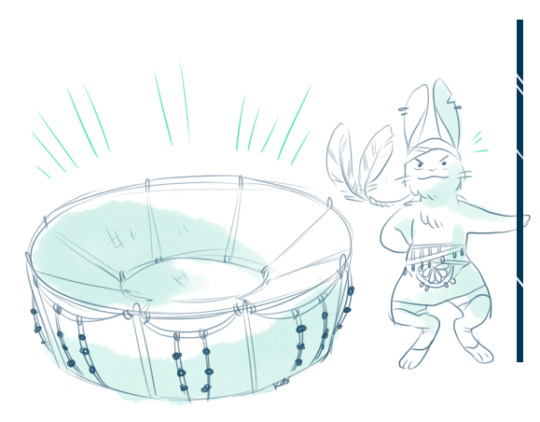
The island’s signature instrument is the Thumpekha, also known as the dancing drum. Rabbits who play this instrument literally dance on top of it; stomping and hopping with great force while tapping the rim with a pole that they twirl and toss during their performance. Its super tiring to play and traditional dances are actually used for guard training. They’re also a good outlet for the hyperactive and many rambunctious kits get marked for dance practice if they can’t focus on their studies. Thumpekha can be played wearing padded wooden shoes but hardcore rabbits do it barefoot and sometimes even light their poles on fire for an added air of drama and completely unnecessary danger. Thumpekha are mainly played at outside gatherings and special events and have the added benefit of warding off predators. No one is sure why. Something about the vibrations.

Bun names are arranged in three parts.
Given Name/First Name: the name your parents give you. For example, Foxglove. Traditional rabbit names are poisonous plants for two reasons. 1: in the olden days it made memorizing poisonous plants easier. if you have an aunt named foxglove it made you think twice when someone offered you a salad with foxglove in it. 2: it was just seen as good luck to do so. Like, if you took on the name of something poisonous then you were seen as less palatable to predators. These names can be passed down to loved ones or used in memory of someone and encompass different spellings because there are a lot of rabbits and even though you and two of your cousins look up when someone shouts ‘Foxglove!’ at least on paper there are some extra h’s and c’s in there to tell you apart.
Blood Name: the equivalent to a last name that you take from your mother’s side. These names are created from combinations of the names of ancestral mates (say, Oleander and Hemlock which can be something like Olehem or Hemander) and the word ‘root’ (which is spelled differently depending on where you live on the island. Example: root, roote, rute, rhoot, rhoote, rhute, ryute, rhyute). The complete Blood Name would be something like Hemanderroot. People used to combine names when they got married but those names got real long real quick and that practice has mostly ended. There are still rabbits walking around with awful disjointedly long last names though.
Family Name: not everyone has this name and the translation from the old Lango word to ‘family’ is shaky at best. It’s basically the name that can either be given to an adoptee by their new family or chosen for yourself for whatever reason. It is very important to note that these are not nicknames and referring to them as such is pretty disrespectful.

There aren’t any vampires on the island of talking magic rabbit people.
That would be silly.
Mainlanders do have tales of leeches though.
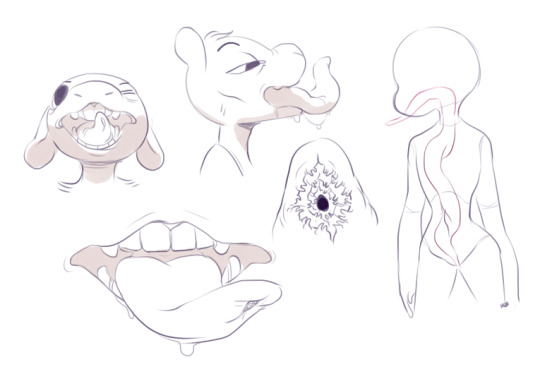
Nasty business. Drinking water from certain lakes and rivers without boiling it first might lead to swallowing a leech egg. A leech egg that hatches and grows and melds with a person’s insides. Imitating the tongue that it eats to nothingness in both function and feeling. Becoming such a part of them that its unclear if they are two separate entities. A leech that this person now needs to keep fed if they don’t want it to tap into their blood stream and kill them both. And it doesn’t need a lot of blood in the grand scheme of things but it needs Enough and it is Unpleasant.
As for sirens, there might have been something on the island that beckoned to people on the water’s edge with convincing words and delicate outstretched hands, but its long gone.

Mainlanders Physically Can’t Come To The Island. There are only a few sapient species that can live on the island without their bodies rejecting the notion of existing there. entire species have been wiped out because they all woke up one day and ran into the sea to try and get away from something that no one has figured out yet. If a mainlander brute forced their way close enough they would black out on their vessel and either wake up swimming/turning around or in rare cases straight up die in a stress induced heart attack. Some people might find this preferable to being misgendered but I’m gonna be real with you, most don’t.

Rabbits have learned that avoidance saves more lives than warfare. Plus, heavy tanks on an island riddled with hidden underground homes probably wouldn’t be great! It could be of use in a mainland war though.

Depending on the water they’d be definitely wet and maybe drowned and sometimes Gone.

If they’re hunted over a long period of time and the scare tactics don’t let up yes. Fear Death is a thing, though they need a long period of intense anxiety for it to take hold.

Answers in order! Nope, Nope, Nope, certain dyes/pelts/metals/magic user services/plants, living bugs and old Ms. Belladonna’s prize winning jam.

Between you and me its an angel but it looks an awful lot like an Alicorn if you squint and listen to the faint whistling of its last shuddering breath.


There’s a joke on the island that every single tree is the same height. This is only half true. Every single tree LOOKS the same height from the coast. Everything is bigger the closer you are to the center.
283 notes
·
View notes